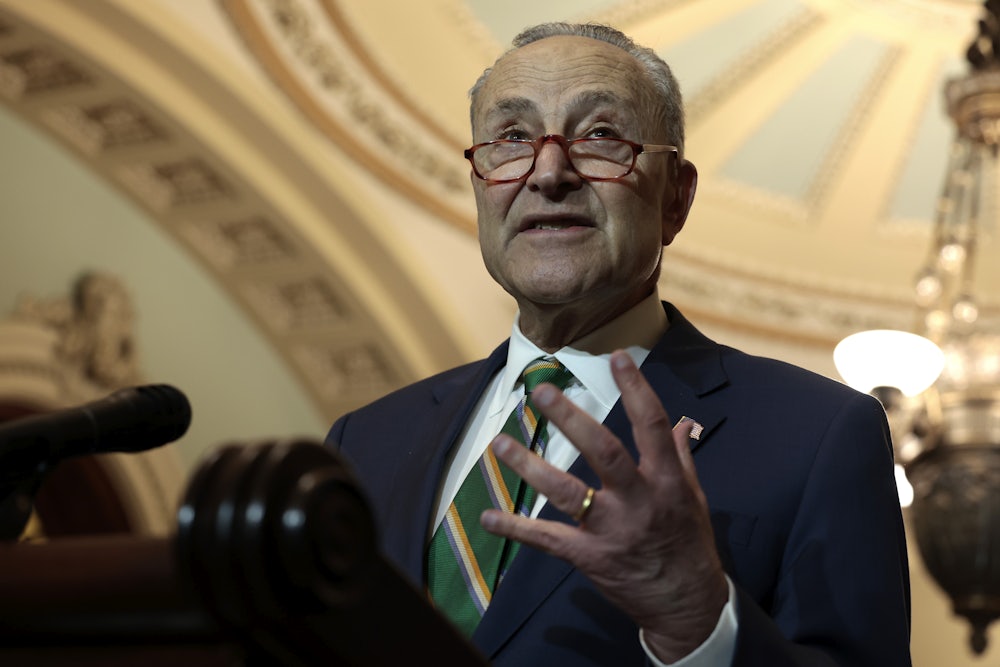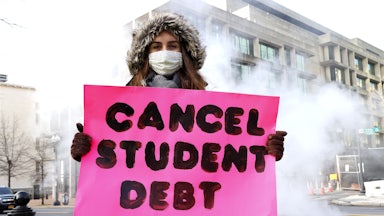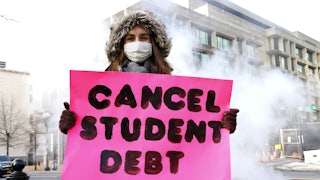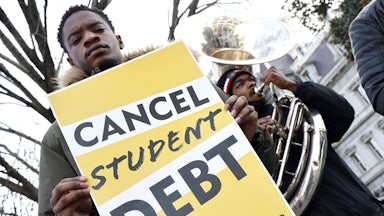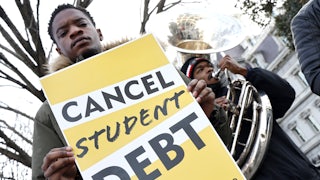President Joe Biden on Thursday indicated that he was mulling ways to reduce student loan debt, although he ruled out forgiving $50,000 in loans, a cause célèbre pushed by many progressives.
“I am considering dealing with some debt reduction. I am not considering $50,000 debt reduction,” Biden said, adding that he is taking a “hard look” at the topic. “There will be additional debt forgiveness, and I’ll have an answer on that in the next couple of weeks.” The president’s comments come after members of the Congressional Hispanic Caucus said that he had indicated willingness to take action to lessen student loan debts in a meeting at the White House this week. Attendees of the meeting later told reporters that Biden had appeared open to forgiving at least $10,000 in student loans per person.
Biden has repeatedly extended a moratorium on federal student loan repayments first implemented by President Donald Trump at the beginning of the coronavirus pandemic. The current extension is set to expire at the end of August, but many congressional Democrats and activists have urged Biden to take more dramatic action.
Student loan debt, including federal and private loans, tops $1.7 trillion, and more than 43 million borrowers have student loan debt. Although borrowers are typically thought of as being younger, borrowers aged 50 or older held 20 percent of all student loan debt in 2019. Recent concerns about rising prices also factor into the discussion about student loans and, relatedly, messaging for Democrats going into the midterms. A recent survey of borrowers by the Student Debt Crisis Center found that 92 percent believe inflation would make it harder to afford their student loan repayments were the moratorium to end. Supporters also say that canceling student loan debt would help close the racial wealth gap, although some argue that gap may be more due to discrimination once Black Americans have entered the job market.
“It would generate so much economic activity in so many aspects of society: homeownership, starting families, new businesses, small businesses. It would be huge,” Representative Jamaal Bowman told The New Republic about canceling student loan debt.
Key Democrats like Senate Majority Leader Chuck Schumer and Senator Elizabeth Warren have called on Biden to cancel at least $50,000 per person in student loan debt, a position also supported by the Congressional Progressive Caucus. (While Congress could theoretically take action to forgive student loan debt, the even split of the Senate and opposition from Republicans would likely prevent such action.)
“We’re getting closer and closer and closer on student loans. I’ve been working relentlessly on the president and his staff, and they seem more open to it now than ever before,” Schumer said on Wednesday. “There’s nothing done yet, but I am really hopeful that the goal that we have had, $50,000 of student loans canceled, is getting more and more likely.”
As a presidential candidate, Biden said that he supported canceling at least $10,000 in student loan debt per person. “I know that the president understands how important it is to cancel a big chunk of student loan debt. I know that he knows how many people across this country are struggling,” Warren told reporters on Thursday. “I’m glad to hear the president talking more about cancellation.”
Democratic Senator Brian Schatz, who described himself as “not one of those people who says $50,000 or bust,” told The New Republic that “any relief we can provide for people with student loans will be very, very welcomed.” Schatz said, “We have a uniquely stupid system, in which we try to encourage our young people to pursue higher education and then we punish them for it.”
/ In honor of Earth Day, TNR’s climate coverage is free to registered users until April 29. Start reading now.
Bowman argued to The New Republic that forgiving $10,000 in student loans would not be enough, arguing in favor of canceling $50,000 or more. “I would want more than that.… The American people need a shot in the arm, and that would be a huge shot in the arm, to cancel the whole thing outright,” Bowman said.
Representative Pramila Jayapal, the chair of the Congressional Progressive Caucus, was more circumspect. “We’ve been pushing for at least [$50,000] with the sense that we’ll probably get somewhere between [$10,000] and [$15,000]. Maybe it’ll be $49,999,” Jayapal told reporters on Thursday, harkening back to a recent meeting between caucus members and Biden. “When we talked to him a couple of weeks ago, when we met with him in the White House, it was clear that this is something he’s really trying to figure out, what the number is.”
Some Democrats also seemed open to some form of means testing, calibrating the amount of student loan debt forgiven based on a borrower’s income. “There’s 45 million people who have loans and are being crushed. Some are being crushed more than others. And if it were up to me, I’d cancel all of it.… If we’re going to have to restrict it, then we’ll have to see what the best way is to do it so that the people that are most disproportionately burdened are the ones who get the most relief,” Jayapal said.
Senator Cory Booker told The New Republic that he was “very open to that, if that’s a compromise,” while Schatz said he did not “have any objection to trying to calibrate it according to the ability to pay.” Schatz added, “I don’t wake up every morning enthusiastic about means testing, but if it’s what it takes to get some relief to this generation of student debt holders, then I’m for it.”
But even if Biden were to take such action, it would not go unchallenged; NBC News reported on Wednesday that some Senate Republicans are introducing legislation to prevent the president from canceling student loan debt.
Senator Lisa Murkowski told reporters on Thursday that she did not believe it would be fair for people who had recently repaid their debts to see others now get their loans forgiven. “What are we doing to lower the cost of higher education? So young people when they’re coming out don’t have these experiences. That’s what we need to be focusing on,” Murkowski said.
Student loan debt cancellation also might face legal challenges questioning whether the administration has authority to take such sweeping executive action. Biden’s chief of staff, Ron Klain, told Politico last year that the president was looking into his “legal authority” to do so.
The idea of forgiving student loan debt is also not universally beloved by all Democrats. Representative Tim Ryan, who is running for Senate in Ohio, told The New Republic that he believed student loan rates were usurious, but that he believed debts should be repaid.
“I support some reduction, some forgiveness—some—because people are getting gouged,” Ryan said. “I believe that if you’ve taken down a loan, you have to pay it back. That’s only fair. I just don’t think you can completely forgive something—you took out a loan, you made an investment, you shouldn’t be gouged.”
